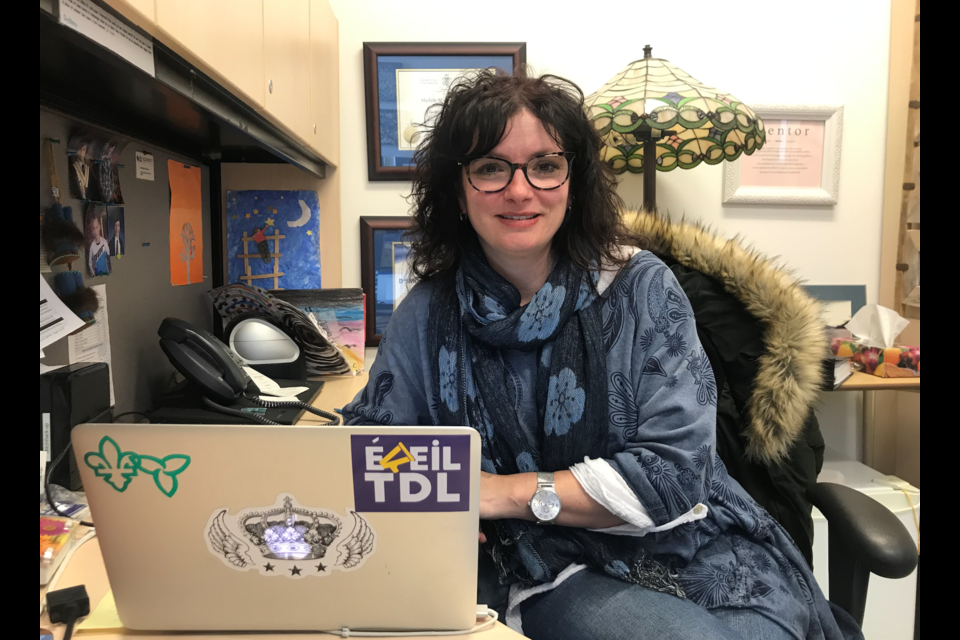We use language every day. Most of the time, we don’t think twice about it. However, when our language abilities are lost or limited, we turn to speech-language pathologists for help.
Having limited language abilities can be a massive challenge for families: from dyslexia in the classroom to patients losing their ability to speak after a stroke. Through a blend of research and clinical care, Laurentian University’s Speech and Language Clinic is addressing these challenges and improving lives. https://laurentian.ca/speech-language-university-clinic
The clinic is part of the School of Speech-Language Pathology at Laurentian University. Here, speech-language pathologists treat patients with speech and language disorders. These clinicians wear many hats; they are researchers, teachers, employers, supervisors, and mentors.
Meet Michèle Minor-Corriveau and Roxanne Belanger, two LU speech-language pathologists and professors working to improve healthcare and language education in Sudbury.
What is speech-language pathology?
“Typically, when people think of speech therapy, they think of a school-age child who can’t pronounce their ‘s,’ but it’s actually more broad than that,” Belanger said.
Speech-language pathologists deliver life-changing therapies to patients in all stages of life and language ability. Children born with a cleft palate have an opening in the roof of their mouth. As a result, they struggle with certain speech sounds. With the help of a speech-language pathologist, they can improve or resolve these difficulties.
Clinicians also help toddlers and school-age children who struggle with reading, writing or pronouncing words. They work with adults who have limited speech abilities following a stroke or injury and older adults losing their ability to communicate due to dementia. Thanks to their expert knowledge of mouth and throat anatomy, speech-language pathologists also help patients who have trouble swallowing due to other medical conditions.
“At some point in their lives, most people will know someone in their family who has required the help of a speech-language pathologist,” Minor-Corriveau said.
All these life-changing therapies began with research. Scientific studies help us understand how language works and build up the body of knowledge clinicians use to help their patients.
Let’s dive into the research
When it comes to language research, Belanger and Minor-Corriveau tackle two sides of the same coin. For many years, Belanger worked closely with the Neonatal Follow-Up Clinic (https://www.hsnsudbury.ca/portalen/Programs-and-Services/NEO-Kids-Family/Pediatric-ACU/Our-Clinics/Neonatal-Follow-Up-Clinic) at Health Sciences North. Babies born prior to a full-term pregnancy often face medical complications later in life. The clinic follows up with families of babies born prematurely to support their development well into childhood.
“Historically, a lot of time and money has been spent on research investigating children born prematurely, but looking at the bigger morbidities: cerebral palsy, blindness, even death,” Belanger said. “There has not been a lot of attention paid to the more minor morbidities, like language delays.”
A child with a language delay develops language skills more slowly than a typical child their age. These delays should not be overlooked. Struggling with reading and writing during school impacts children’s ability to graduate, pursue post-secondary education, and find jobs in adulthood. Individuals with speech and language difficulties are also overrepresented in the criminal justice system. http://www.probation.ie/EN/PB/0/DF45517DE62D461B802584C1004B7CD9/$File/1.IPJ%20Vol%2016%20CL%20Full%20Version.pdf#page=24
“There’s new research showing a classroom-to-prison pipeline,” Belanger said. “Some speech pathologists doing research in the judicial system show that 70-80 per cent of people in that system have unidentified speech and language disorders.”
She believes early intervention is the best solution.
“If we can prevent or mitigate or make less severe these delays in children, we’ll be able to help.”
While Belanger explores language delays, Minor-Corriveau’s research seeks to improve the French language curriculum. She tested children’s French language abilities at four different school boards across Ontario. Using these results, she can shape the Ontario curriculum to better match the children’s language skills at each grade level.
“You want to target certain goals that the child is almost ready for,” Minor-Corriveau said. “If what you’re doing in the classroom is so far beyond what a child can understand, we’re not maximizing on their skills or their time.”
Minor-Corriveau is an advocate for meeting children where they’re at. Providing laptops and audiobooks is a great way to support children with language difficulties, helping them keep up with reading and writing in class. Just like many people need glasses to see clearly, creating a curriculum that is inclusive and flexible lets students of all language abilities thrive.
Roxanne Belanger and Michèle Minor-Corriveau’s research helps us better understand the language we speak every day. When combined with their clinical practice, these LU researchers are the changing lives of their patients, students, and community.
Ive Velikova is a science communication student at Laurentian University and the host of the Science Sucks podcast. You can find the podcast on Stitcher and other podcast sites.
Sources:
Houston, S., & Butler, M. (2019). 'More than Just a Number': Meeting the Needs of Those with Mental Illness, Learning Difficulties and Speech and Language Difficulties in the Criminal Justice System. Irish Probation Journal, 16.
